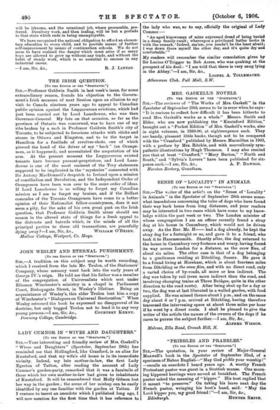SENSE OF "LOCALITY" IN ANIMALS.
LTO THE EDITOR OF THE"SPECTATOR."]
SIR,—The wiiter of the article on the "Sense of 'Locality' in Animals" in the Spectator of September 29th seems some- what inaredulous concerning the tales of dogs who have found their way back home from long distances, and your readers may be interested in two cases which have come to my know- ledge within the past week or two. The London minister of whose congregation I am an officer recently found a stray dog at his house in Canonbury, which would not be driven away. As the Rev. Mr. H— had a dog already, he kept the stray dog for a fortnight or so, and gave it to a friend, who took it to FIammersmith. Shortly after, the dog returned to the house in Canonbury very footsore and weary, having found its way across London for a distance, as the crow flies, of about six miles. The other case is that of a dog belonging to a gentleman residing at Ditchling, Sussex. He gave it to a friend living at Horsham, which is about fourteen miles from Ditchling as the crow flies, and with no direct road, only a varied choice of by-roads, all more or less indirect. The dog was taken by rail (even more indirect than the road, and involving changing trains at Three Bridges, quite in the other direction to the road route). After being shut up for a day or two, the dog was at last liberated in a walled garden, with food supplied. He was missed thence about 1 p.m., and on the same day about 6 or 7 p.m. arrived at Ditchling, having therefore traversed the intervening space at about three miles per hour if he went by a direct route. I shall be pleased to give the writer of the article the names of the owners of the dogs if ho cares to pursue the subject further.—I am, Sir, &a.,
Melrose, Ella Road, Crouch Hill, N.
ALFRED WILSON.






























































 Previous page
Previous page